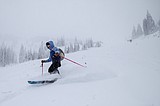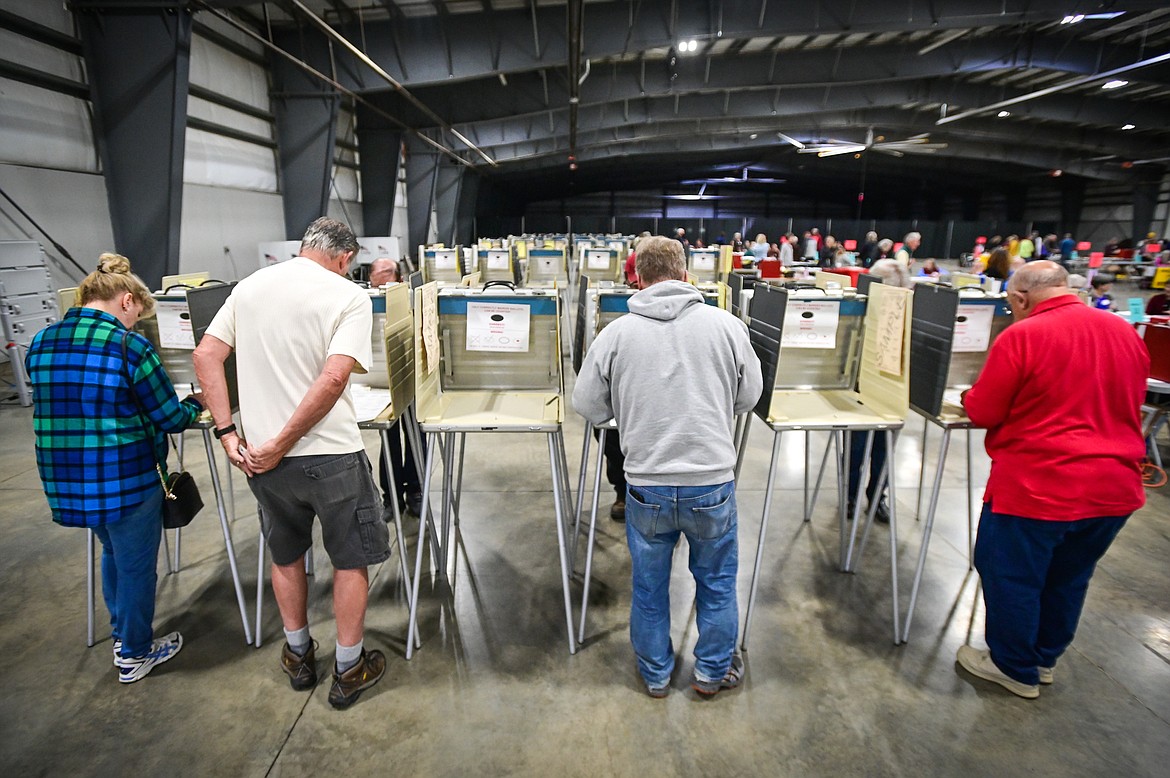Flathead leaders lobby for election reform ballot initiatives
KATE HESTON | Hagadone News Network | UPDATED 1 year, 8 months AGO
Kate Heston covers politics and natural resources for the Daily Inter Lake. She is a graduate of the University of Iowa's journalism program, previously worked as photo editor at the Daily Iowan and was a News21 fellow in Phoenix. She can be reached at [email protected] or 406-758-4459. | April 2, 2024 12:00 AM
Montanans could see two constitutional amendments on the November ballot, twin initiatives that supporters argue will improve election integrity and empower voters.
Supporters of CI-126 and CI-127, the two citizen-led election reform initiatives, are attempting to qualify for the November ballot by gathering signatures from across the state. Each initiative needs more than 60,000 signatures to qualify.
“I don't feel like people have been more ready for a change, a fundamental change in how we choose people to govern, than right now,” said former Kalispell Police Chief and Republican state legislator Frank Garner this week.
Garner, who is on the board of Montanans for Election Reform, the group behind the initiatives, feels confident that they will receive enough signatures to put the initiatives before voters in November.
CI-126 would create a top-four primary system wherein all candidates for an office would appear on the ballot together regardless of party affiliation. The top four vote-getters would advance to the general election. Were it to meet with voter approval, the change would apply to the elections for governor, lieutenant governor, secretary of state, auditor, attorney general, superintendent of public instruction, state representatives and senators, and U.S. representatives and senators.
CI-127 requires the winning candidate in the general election to secure a majority of votes in that election, meaning they need more than 50% of the state’s total votes to take office.
Supporters say that the changes would curtail the influence of special interest groups and party power brokers.
“I want [voters] to know that this gives them a stronger voice in our elections … It's bipartisan, it's broad-based and it gives them the choice out of all the candidates,” said Sue Corrigan, initiative supporter and member of the Kalispell Public Schools Board of Trustees.
The current lay of the land rewards divisiveness, making compromise increasingly difficult to find, according to Garner. He and other supporters argue their reforms would elevate candidates with broad support among voters.
“It’s about time Montanans had the right to choose between the status quo and reform that we know will change the way we govern,” Garner said.
Garner anticipates opposition to the initiatives. Those who think that the current system is serving people well may not be in support of these initiatives, he said. But most people, Garner said, feel like “we not only can do better, but we have to.”
Whitefish state Rep. Dave Fern, a Democrat, also expressed support for the reforms. The initiatives could harken a return to collaboration and compromise, he said.
The current election system doesn’t necessarily represent the general feeling of the state’s voters, Fern said. The initiatives would allow for voters to have more participation in the process, he said.
“I think that this will empower more people, significantly more people, to participate in very important decision making,” Fern said. “And this is especially true in situations, and there are many of them across the state … where there are noncompetitive districts.”
Garner, Corrigon and Fern all attended a signature gathering launch for the initiatives on March 14 in Kalispell. The event was successful, the attendees stated, and they have high hopes that the signature requirement will be met.
“For me, when I got done with my service I had to consider what was the most important use of the experience I had. For me, this initiative is clearly it,” Garner said. “... We see divisiveness in politics and the inability to solve tough problems. It’s important to work across the aisle and that is getting increasingly hard to do.”
Advocates have until June to gather signatures. Each initiative must earn more than 60,000 signatures from registered voters and the signatures must be representative of 40 of the state’s 100 legislative districts.
Reporter Kate Heston can be reached at [email protected] or 758-4459.
ARTICLES BY KATE HESTON

Veteran-owned mobile boat repair service anchors down in the Flathead Valley
The Kramers launched Flathead Mobile Marine to use their skills — they have decades of experience performing routine maintenance checks on a variety of boats as well as working with engines and electrical systems — and help boaters in the community.

With ski season near, resort reaches deal with staff
After 18 months of negotiations, Whitefish Mountain Resort executives and the resort’s ski patrol union are finalizing a one-year contract for the upcoming season.

Trapped in a car wreck, Woods Bay woman credits teens with saving her life
Driving home from a quilting event in Bigfork in September of last year, Carol Martin remembered that the sky was clear, the sun was shining, and she had a headache.

